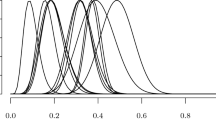Abstract
Fuzzy synthetic rating is a mapping to capture the relationship between the characteristics of an object in a group and its overall fuzzy rating. This paper presents a general treatment on the problems of fuzzy synthetic rating based on factor space, fuzzy clustering and Lee–Tanaka’s idea of transferring the learning task of fuzzy regression NN by means of solving a kind of linear programming, called Lee–Tanaka’s LP problem by the author here. The author presents a satisfying solution for the LP problem. The satisfying solution is not necessarily an optimal solution in the traditional sense. That is, the fuzzy optimal methodology could be applied even when the feasible region is empty.
Similar content being viewed by others
References
Alex R (2004) Fuzzy normal regression model and related neural networks. Soft Comput 8(10):717–721
Alex R (2006) A new kind of fuzzy regression modeling and its combination with fuzzy inference. Soft Comput 10(7):618–621
Cheng C-B (2005) Fuzzy process control: construction of control charts with fuzzy numbers. Fuzzy Sets Syst 154:287–303
Cheng C-B, Lee ES (2001) Fuzzy regression with radial basis function network. Fuzzy Sets Syst 119:291–301
Granath G (1984) Application of fuzzy clustering and fuzzy classification to evaluate the provenance of glacial till. Math Geol 16(3):283–301
Lee H, Tanaka H (1999) Fuzzy approximations with non- symmetric fuzzy parameters in fuzzy rgtression analysis. J Oper Res Soc Jpn 42:98–112
Savic DA, Pedrycz W (1991) Evaluation of fuzzy linear regression models. Fuzzy Sets Syst 39:51–63
Tanaka H (1987) Fuzzy data analysis by possibilistic linear modes. Fuzzy Sets Syst 24:363–375
Wang PZ (1983) Fuzzy Sets theory and its applications. Shanghai Scientific & Technical Publishers, Shanghai
Wang PZ (1990) A factor space approach to knowledge representation. Fuzzy Sets Syst 36:113–124
Wang PZ, Loe KF (1993) Between mind and computer: fuzzy science and engineering. World Scientific Publisher, Singapore
Yang M-S, Yang L, Lin T-S (2002) Fuzzy least-squares linear regression analysis for fuzzy input-output data. Fuzzy Sets Syst 126:389–399
Author information
Authors and Affiliations
Corresponding author
Rights and permissions
About this article
Cite this article
Alex, R. Fuzzy synthetic rating and a satisfying solution for Lee–Tanaka’s LP problem. Soft Comput 11, 901–910 (2007). https://doi.org/10.1007/s00500-006-0141-z
Published:
Issue Date:
DOI: https://doi.org/10.1007/s00500-006-0141-z




